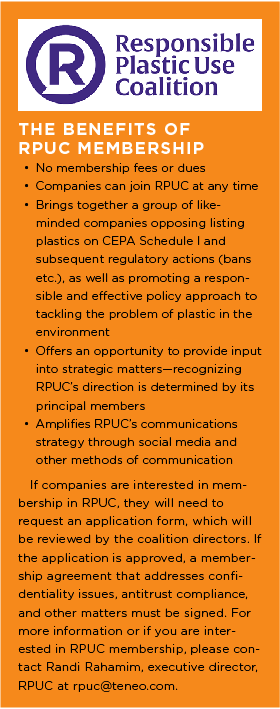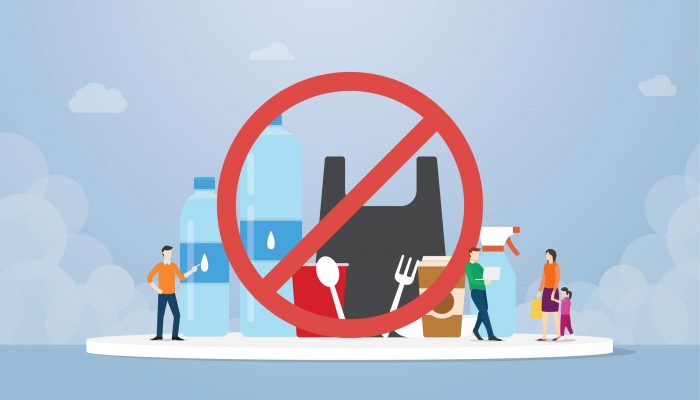FPA has many advocacy priorities. These include ensuring that the flexible packaging industry is represented in legislative and NGO discussions on solid waste management, material composition transparency, sustainability, the role of flexible packaging in reducing food and product waste, and food and medical packaging safety concerns. FPA’s goal is to be part of a proactive solution to packaging circularity and to protect flexible packaging into the future.
As you likely are aware, the Canadian federal government is currently proposing to designate all plastic manufactured items as a Schedule 1 “toxic” substance under the Canadian Environmental Protection Act (CEPA) to ban six single-use plastic items—bags, straws, stirrers, utensils, six-pack rings, and food service ware. This label is not only scientifically inaccurate but sets an extremely bad precedent that could have far-reaching and unintended consequences beyond Canada.
As a result, the FPA is partnering with the Responsible Plastic Use Coalition (RPUC). RPUC is comprised of industry leaders from across Canada within the plastics value chain and was organized to take action on this issue. The group has a shared belief that Canadians deserve a responsible and effective policy approach to tackling the problem of plastic in the environment and is seeking associate members to join the coalition and to raise awareness on this issue.
The proposed “toxic” designation will grant the Canadian government the power to regulate additional items with plastic content without public and stakeholder consultation. This can include plastics that Canadians rely on to sustain everyday life—from eyeglasses to protective equipment to health care products to medical devices to computers and phones.
Designating plastic-manufactured items as “toxic” will impact much more than suppliers and manufacturers in Canada. The government’s current path will be precedent-setting on a global level, and we know that many other countries are closely watching the issue unfold in Canada. The U.S. has also raised concerns that Canada’s position on plastics contradicts the “pause-and-check” spirit of the Canada-United States-Mexico Agreement (CUSMA)—or USMCA as it is known in the United States—and may amount to a non-tariff trade barrier.
According to RPUC, using CEPA to declare plastic manufactured items “toxic” is a significant overreach by the Canadian federal government and will have unnecessary and unintended consequences, including:
- Making it more difficult to create a circular economy for plastics
- Preventing new recycling pathways for plastics
- Increasing cost and confusion for consumers
- Reducing investment and innovation by the industry due to uncertainty and changing regulations
- Driving negative environmental outcomes
Many plastic alternatives are worse for the environment when looking at the full lifecycle of the item. Lifecycle analysis consistently shows that flexible plastic packaging has preferable environmental attributes for carbon impact, fossil fuel usage, and water usage—as well as material disposed of—when compared to other package formats. This is due to the efficient use of resources enabled by flexible packaging and plastic laminates.

The problem Canada is facing is not plastic—it is plastic waste in the environment. RPUC and FPA believe there are far more impactful policy solutions to divert waste from the natural environment. The coalition wants to work with governments across the country on innovative solutions that are based on science to tackle the challenge of plastic waste. This can be achieved through the implementation of a framework that unifies a Canadian zero-plastic-waste agenda supported by all levels of government: federal, provincial, and territorial.
In April, FPA hosted a webinar for members on the importance of companies registered for doing business in Canada to become members of the coalition. RPUC is approaching like-minded groups in the plastics value chain to join as “associate members” to be part of a broad coalition of organizations that believe bans are merely hollow reactions and that a scientific approach is necessary for solutions to the challenge of waste in the environment.
RPUC provides a platform for associate members to lend their voice to the plastics conversation to help ensure that plastic is not designated as a “toxic” substance. In addition, RPUC will communicate on behalf of manufacturers and suppliers of plastic manufactured items on related issues.
RPUC has developed a detailed strategic communications plan to support its education efforts. Associate members will have the chance to lend their voice to the coalition and highlight concerns with the federal government’s approach. This will include opportunities to be active in mainstream and social media, as well as a role in helping to continue to grow the coalition.
Dani Diehlmann is vice president, communications at FPA.
